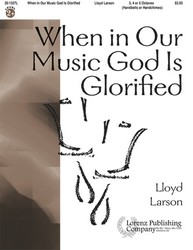- |
User Links
All Praise to Thee, for Thou, O King Divine
All praise to Thee, for Thou, O King divine
Author: Bland Tucker (1938)Published in 52 hymnals
Audio files: MIDI, Recording
Representative Text
1 All praise to thee, for thou, O King divine,
didst yield your glory that of right was thine,
that in our darkened hearts thy grace might shine:
Alleluia!
2 Thou cam'st to us in lowliness of thought;
by thee the outcast and the poor were sought,
and by thy death was God's salvation wrought:
Alleluia!
3 Let this mind be in us which was in thee,
who wast a servant that we might be free,
humbling thyself to death on Calvary:
Alleluia!
4 Wherefore, by God's eternal purpose, thou
art high exalted o'er all creatures now,
and given the name to which all knees shall bow:
Alleluia!
5 Let every tongue confess with one accord
in heaven and earth that Jesus Christ is Lord;
and God the Father be by all adored:
Alleluia!
Source: Common Praise: A new edition of Hymns Ancient and Modern #372
Author: Bland Tucker
Francis Bland Tucker (born Norfolk, Virginia, January 6, 1895). The son of a bishop and brother of a Presiding bishop of the Episcopal Church, he was educated at the University of Virginia, B.A., 1914, and at Virginia Theological Seminary, B.D., 1920; D.D., 1944. He was ordained deacon in 1918, priest in 1920, after having served as a private in Evacuation Hospital No.15 of the American Expeditionary Forces in France during World War I. His first charge was as a rector of Grammer Parish, Brunswick County, in southern Virginia. From 1925 to 1945, he was rector of historic St. John's Church, Georgetown, Washington, D.C. Then until retirement in 1967 he was rector of John Wesley's parish in Georgia, old Christ Church, Savannah. In "Reflecti… Go to person page >Text Information
Related Texts
| First Line: | All praise to Thee, for Thou, O King divine |
| Title: | All Praise to Thee, for Thou, O King Divine |
| Author: | Bland Tucker (1938) |
| Meter: | 10.10.10 with alleluias |
| Language: | English |
| Refrain First Line: | Alleluia! Alleluia! |
| Copyright: | © The Church Pension Fund. |
Tune
ENGELBERGCharles V. Stanford (b. Dublin, Ireland, 1852; d. Marylebone, London, England, 1924) composed ENGELBERG as a setting for William W. How's "For All the Saints" (505). The tune was published in the 1904 edition of Hymns Ancient and Modern with no less than six different musical settings. It is clearly…
SINE NOMINE
Ralph Vaughan Williams (PHH 316) composed SINE NOMINE for this text and published it in the English Hymnal in 1906. Vaughan Williams wrote two harmonizations¬–one for unison stanzas and one for choral stanzas. The tune's title means "without name" and follows the Renaissance tradition of naming c…


 My Starred Hymns
My Starred Hymns







